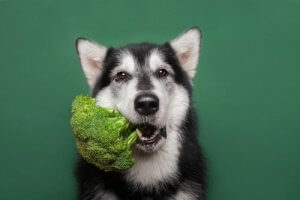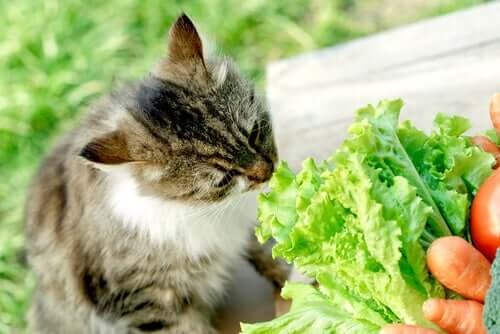Vegan Pets - How It Impacts Their Health

These days, more and more people are making the decision to change their diet out of respect for animal life. Because of that, when they have a dog or a cat, the animals are forced to follow the nearly religious precepts of their owners. Vegan pets are now quite common, and we should find out whether they’re healthy, and how the lack of certain nutrients impacts on their health.
Vegan pets
For some people, veganism is an eccentricity, and a fad intended for wealthy people. But the truth is that more and more people are making the decision to stop eating meat, and products derived from the so-called “exploitation” of animals, such as milk, eggs, honey and jello.
But that’s not all; these people often go as far as to give a vegan-only diet to their carnivore pets. Yes, that’s right, they actually eliminate all animal products from their dog or cat’s bowl too! As part of their philosophy on life, some vegans affirm that they can’t tolerate seeing or smelling – and much less manipulating – dead animal flesh in order to feed the animals under their care.
Due to an increase in vegan people and pets in the world, many pet food companies that have already added specialty foods. The base is often flax seeds, beet pulp, and lentils. All of which supposedly make up for the protein found in traditional meat, chicken, fish, dairy and other animal products.
Veterinarians say that such food products may appear to be healthy, but they can’t comprise 100% of an animal’s diet. This is because they don’t even come close to meeting the minimum requirements and nutrients that our carnivore furry friends need.
Cats and veganism

Also, in order to meet their need for amino acids, a cat would have to consume excessive amounts of vegetable products, because these kind of proteins are less digestible for cats. So, sooner rather than later, there’ll be physical changes in the cat, such as low weight, diseases, apathy, etc.
Cats cannot thrive on a vegan diet because they need the components that only meat and fat can provide for their proper development and growth, and also to maintain their immune system in good shape. A vegan diet in cats only leads to serious illnesses. Two examples of these are retinal degeneration and dilated cardiomyopathy.
Vegan pets – dogs
Dogs are omnivorous. That means they can eat both animal and plant foods. However, having them follow a strictly vegan diet is not a good idea at all.
Even though the impact of a vegan diet isn’t as serious in dogs as it is in cats, such a diet might lead to food intolerance, overweight, dermatological disorders, intestinal inflammation, immune response failures, loss of bone mineral density, and even diabetes.
It’s not at all recommended to completely remove meat from a dog’s diet. However, you can definitely reduce their consumption of it as long as you complement it with good quality vegetable proteins. Also bearing in mind that these should have the necessary amount of fiber and vitamins to meet the animal’s needs.
Keep in mind that, without meat, your dog will lack certain nutrients, such as essential fatty acids and amino acids.
Unnecessary humanization

You cannot change the essence of an animal to the point of not offering them what they need to be healthy and strong. Doing otherwise is not only dumb, but cruel. Forcing your carnivore friend into a vegan diet is a form of animal abuse. Are you truly willing to mistreat your best friend?
These days, more and more people are making the decision to change their diet out of respect for animal life. Because of that, when they have a dog or a cat, the animals are forced to follow the nearly religious precepts of their owners. Vegan pets are now quite common, and we should find out whether they’re healthy, and how the lack of certain nutrients impacts on their health.
Vegan pets
For some people, veganism is an eccentricity, and a fad intended for wealthy people. But the truth is that more and more people are making the decision to stop eating meat, and products derived from the so-called “exploitation” of animals, such as milk, eggs, honey and jello.
But that’s not all; these people often go as far as to give a vegan-only diet to their carnivore pets. Yes, that’s right, they actually eliminate all animal products from their dog or cat’s bowl too! As part of their philosophy on life, some vegans affirm that they can’t tolerate seeing or smelling – and much less manipulating – dead animal flesh in order to feed the animals under their care.
Due to an increase in vegan people and pets in the world, many pet food companies that have already added specialty foods. The base is often flax seeds, beet pulp, and lentils. All of which supposedly make up for the protein found in traditional meat, chicken, fish, dairy and other animal products.
Veterinarians say that such food products may appear to be healthy, but they can’t comprise 100% of an animal’s diet. This is because they don’t even come close to meeting the minimum requirements and nutrients that our carnivore furry friends need.
Cats and veganism

Also, in order to meet their need for amino acids, a cat would have to consume excessive amounts of vegetable products, because these kind of proteins are less digestible for cats. So, sooner rather than later, there’ll be physical changes in the cat, such as low weight, diseases, apathy, etc.
Cats cannot thrive on a vegan diet because they need the components that only meat and fat can provide for their proper development and growth, and also to maintain their immune system in good shape. A vegan diet in cats only leads to serious illnesses. Two examples of these are retinal degeneration and dilated cardiomyopathy.
Vegan pets – dogs
Dogs are omnivorous. That means they can eat both animal and plant foods. However, having them follow a strictly vegan diet is not a good idea at all.
Even though the impact of a vegan diet isn’t as serious in dogs as it is in cats, such a diet might lead to food intolerance, overweight, dermatological disorders, intestinal inflammation, immune response failures, loss of bone mineral density, and even diabetes.
It’s not at all recommended to completely remove meat from a dog’s diet. However, you can definitely reduce their consumption of it as long as you complement it with good quality vegetable proteins. Also bearing in mind that these should have the necessary amount of fiber and vitamins to meet the animal’s needs.
Keep in mind that, without meat, your dog will lack certain nutrients, such as essential fatty acids and amino acids.
Unnecessary humanization

You cannot change the essence of an animal to the point of not offering them what they need to be healthy and strong. Doing otherwise is not only dumb, but cruel. Forcing your carnivore friend into a vegan diet is a form of animal abuse. Are you truly willing to mistreat your best friend?
All cited sources were thoroughly reviewed by our team to ensure their quality, reliability, currency, and validity. The bibliography of this article was considered reliable and of academic or scientific accuracy.
- Dodd, S. A. S., Cave, N. J., Adolphe, J. L., Shoveller, A. K., & Verbrugghe, A. (2019). Plant-based (vegan) diets for pets: A survey of pet owner attitudes and feeding practices. PLoS ONE. https://doi.org/10.1371/journal.pone.0210806
This text is provided for informational purposes only and does not replace consultation with a professional. If in doubt, consult your specialist.








